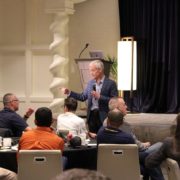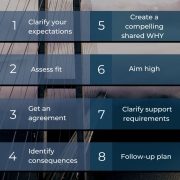The Essential Matters – What Is Your Reason For Being?
Last month I was meeting with a group of very talented managers in a debrief session for an event I facilitated in December. We were discussing, among other things, employee engagement when one of the leaders said that what he learned in my session is that employee engagement can be boiled down to one word: authenticity. When people are authentic, they are engaged. They are committed to their own development and they are committed to bring to bring value to others.
Authenticity is about being the person you were created to be and bringing more of that self to what you do. When you are working in an environment that supports and encourages you to be authentic, you are naturally going to be engaged, empowered, and loyal. Authentic leadership is ultimately about discovering your own authentic nature and then creating a culture that enables others to discover and express theirs. It’s that simple and it’s that complex.
A helpful way to express, in practical terms, what it means to be authentic was shown to me by an authentic leader I worked with last year. The focus of my work with his organization was to help him build a stronger, more aligned, high-performing organizational culture. After the workshop he emailed me a diagram of Ikigai (生き甲斐), a Japanese concept meaning “a reason for being”. Everyone, according to the Japanese, has an Ikigai. Finding it requires a deep and often lengthy search of self and answering three fundamental questions:
- What do you love? Pay attention to your energy. Energy is a good indicator of what you love. We are energized by things we love and depleted by things we don’t. Leaders are the stewards of organizational energy. Leaders inspire or demoralize others by how they mobilize, focus, invest, and renew the collective energy of those they serve. To be aware of how your energy affects those around you, it’s important to pay attention to your own energy. How do you feel when you are doing certain things? Is it natural for you or are you trying to imitate somebody? What activities drain you? What activities fill you up? What work would you do if you weren’t paid to do it? What is your passion? What do you love?
- What are you good at? You can become good at many things with repetitive actions and thoughts, but this question is asking you to look deeper inside yourself to discover a yearning that is in need of expression. We all have unique talents and gifts. Whether these come easily or not, there is a longing within us to be expressed. It might require developing or it may come naturally. Just as good leadership is about fitting people, not fixing people, when you are doing what you are good at, it fits, not fixes who you are. Discovering what you are good at emerges from asking yourself questions like, “What have you been yearning for? What do you desire intensely to do? What do you do well – that you don’t remember learning? What are your strengths? What are your gifts?”
- What does the world need? What is the world asking of you? Where in the world do you feel needed? Perhaps, through your own experiences of grief or compassion you have found a capacity to reach others. Or maybe you see an opportunity to provide a service that is in high demand in the marketplace. Even if you can’t find your passion or your gifts, what the world needs is for you to be at peace with yourself so you can bring peace to the world – a positive, caring attitude to whatever you do. The world needs whatever you can contribute today. Above all, the world needs a generous spirit.
In the upcoming year, set aside some time away from the crushing wave of demands of daily life, to search for and gain some clarity about your Ikigai – your authentic self. Set aside some time every week to reflect, write in a journal, and ask yourself some of these questions. Take a course and explore a hidden passion; create an authentic community – a coach, mentor, therapist, support group, or confidants – to help guide you to the truth about yourself and what you most desire to bring to the world. Don’t be concerned if you don’t get complete clarity. This is an ongoing, life-long process. What is important is persistent attention. Living authentically is a journey, not a destination.
In the words of Rainer Maria Rilke, the Austrian poet and novelist:
Be patient toward all that is unsolved in your heart. Try to love the questions themselves. Do not seek the answers which cannot be given because you would not be able to live them.
And the point is to live everything, live the questions now. Perhaps you will then gradually, without noticing it, live along some distant day into the answers.









